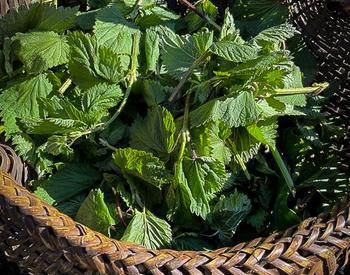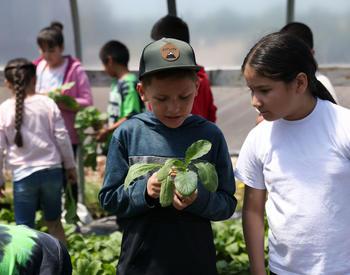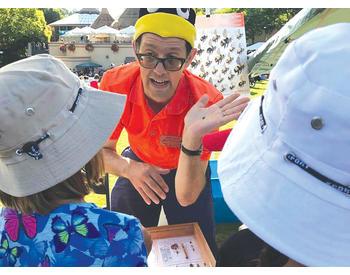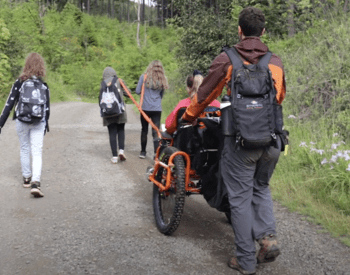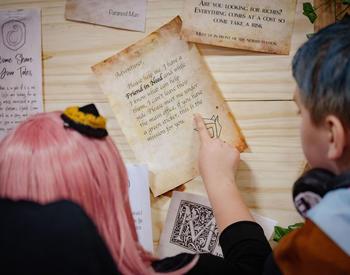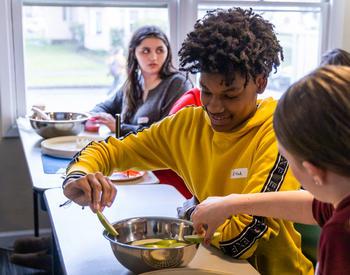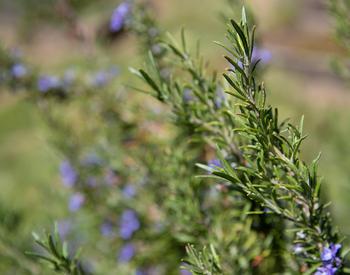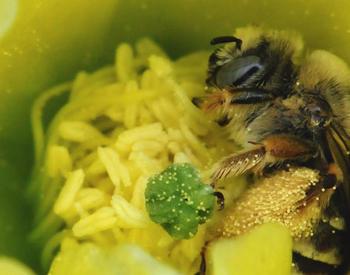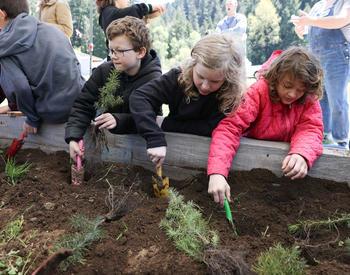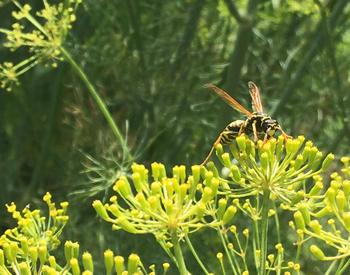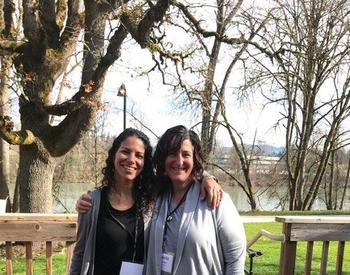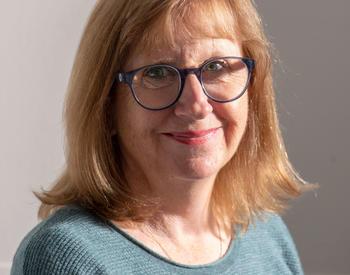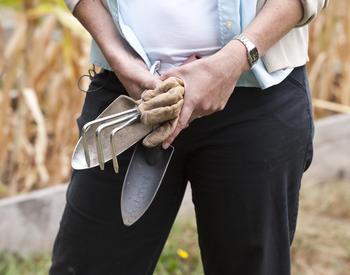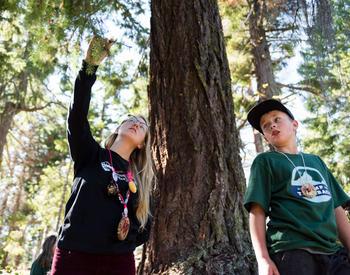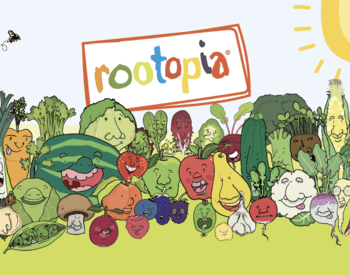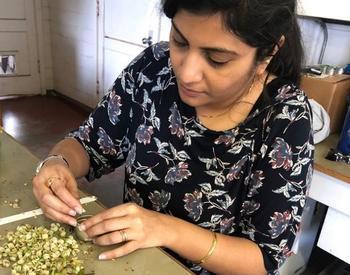Transcript
Andony Melathopoulos: [00:00:00] One project I've contributed to over the last few months that I've been so excited about is a new coloring book of the bees of Oregon that connect those bees with the food that we eat that's grown here in Oregon. It's really the brain child of Sarah Kincaid, my lab manager, she's been working on this project for quite a long time, and it really came together after we connected with OSU’s Nutritional Education Program. Working with nutritional education got me thinking a lot about this feature in a lot of our schools, the school garden, which is connected to nutrition, but also to educational outcomes.
[00:00:39] So I was really excited to learn that OSU had hired a new State Food Hero Garden Education Coordinator, Halie Cousineau, who's going to be joining us today. She's going to talk about the school garden programs, how to make the connection between pollinator education and those school gardens. There's some innovative ways to do it that doesn't create a lot of [00:01:00] red tape and also some of her ideas are forthcoming to really bring that education about pollinators into our classrooms. So we're going back to school on this episode of PolliNation.
[00:01:17] We're rolling now. Welcome to PolliNation. I'm so glad to have you here.
[00:01:23] Halie Cousineau: [00:01:23] Thanks for having me.
[00:01:25] Andony Melathopoulos: [00:01:25] Now, I wanted to bring you on today. You and I are working together with a team on a coloring book, which is really exciting.
[00:01:33] Halie Cousineau: [00:01:33] Yeah.
[00:01:33]Andony Melathopoulos: [00:01:33] And so we've met, but in those conversations I got to know that you have a lot of experience with education and gardens. Just to start things off, why are gardens important for school?
[00:01:46]Halie Cousineau: [00:01:46] As big as a question that is, I'll try to give a concise answer. Gardens are pretty essential I'd say for education in general, beyond just the quality of school. You [00:02:00] can increase healthy access to food, direct access to growing food and learning about nutrition and hands-on skills. But then it definitely is an applied learning strategy for using it in an educational setting. So you can learn about math, science, language arts, English, geography, even. All sorts of subjects can be applied into a school garden.
[00:02:22] But you have the kids moving, you don't have them sitting down quietly training an eight year old how to not talk and listen to you. You have them up and asking questions and interacting and getting their hands dirty, learning how to use tools, learning how to use math, but not on a piece of paper, but in real life learning how to build. And also creating a lot of skills around respect and listening, leadership, and then also working in groups. So all of those skills are very much applied and necessary in a school garden education system.
[00:02:50] Which is why I really push for gardens in schools because it helps education and it fortifies what you're learning. It gets kids interactive and [00:03:00] excited. I can't tell you how often kids are ecstatic to show me things that they find in the garden. And to find that enthusiasm within education is just quite inspiring on a day-to-day basis. Which also keeps me as an educator, like on my toes, excited, wanting to bring new fresh things into class. I might have the same curriculum I repeat over and over again in each school that I go to every day, every single lesson is totally different and new and exciting for me.
[00:03:26] So the kids get the same basic education, but also just a new, fresh little inspirational thoughts and tidbits that I have. And so I think it's great for the education system, but then also the school, because then, you can get fresh veggies in your lunch that are grown right outside your door. So it's more environmentally friendly. It's easier in a way for the cooks, as long as they don't mind chopping up vegetables. Instead of the pre-packaged food that they get. So I think it's a plus in that way,
[00:03:55] Andony Melathopoulos: [00:03:55] Well I can imagine there's [00:04:00] something very kind of concrete when you're trying to work out a math problem. "How many seeds do I put in this square?" That's a very practical, tangible concept. But also for the teachers themselves, who I imagine, although there must be a lot of challenges and they need a lot of support when they come and take their lessons out into the garden - it must be so nice to get out of that classroom.
[00:04:24] Halie Cousineau: [00:04:24] Absolutely. And sometimes the most feedback I get from a class is the teachers telling me like, "Oh my God, I learned so much today." And there was supposed to be grading, the kids' essays or a math quiz or something. But I find them sitting there listening to me and learning from my lessons. Simply because taking lessons outside or talking about plants and bugs and how cool plants are and how cool bugs are, it's just fun. It simply makes learning fun. And it gets everyone so enthralled by it that even the teacher who's supposed to be grading or something else while I'm there is then sitting and listening [00:05:00] to my lesson.
[00:05:01] Andony Melathopoulos: [00:05:01] Now I want to get into the actual programs in schools, but obviously we're now in the pandemic, we're in this situation, but I do get a lot of questions from people who have kids at home they've got a garden growing in the back. I imagine there's been a real scramble to get resources to those families and, like "How can I keep my kids engaged and off of Zoom". But eventually I imagine, hopefully soon, we're going to be back in school and there are these school garden programs. Can you give me an example of what a really good connection between the school activities and the garden activities? What does that look like?
[00:05:44] Halie Cousineau: [00:05:44] Yeah, I will say, this is going to depend on what county you're in, maybe what school you're in and what access to different things that you might have in your school. For me working for OSU, I do school garden education. I was just a school garden educator last year. This year I coordinate [00:06:00] across the State. But if you have, let's say an OSU school garden, SNAP-Ed, or Food Hero program you have a teacher that comes in and does ideally an in-class and then an after-school garden education program.
[00:06:14] So when I came in, it would depend on the teacher even, so some teachers would allow me in there for an hour, others, 15 minutes to 20 minutes. I always pushed it an extra five and we do school garden. If I did an hour, I do 20 minutes in the class. We'd do sitting and learning and then we'd go out and do hands-on learning for the rest of it. If I had just 20 minutes, I talk real fast where I'm leading the kids out to the garden. I get them in there and they learn what they're doing. And we go over lessons outside in the garden and they're actually doing what I'm telling them to do. On rainy days we're inside we're still talking about gardens. We still would do garden planning, they'd make big maps of what they want their ideal garden to look like.
[00:06:54] And then we have an after-school program which ranges again from 30 minutes to an hour and a half, depending on the [00:07:00] school. And usually we have fourth and fifth grade for an after-school program. Occasionally I'll have a third grade program if a school wants to do two different days, but it is hard to do K-5 in one afterschool program. I've done it, it wasn't great for me. And I don't think the kids learned as much. So usually do fourth and fifth after school. And any grade in school we do in-class lessons.
[00:07:26]But usually the obstacle programs are just longer because I'm not taking up a teacher's time period. And then I do interact with the lesson plan for the teacher. So I really try to coordinate what I'm teaching to back up or help re-teach what they just learned in their math class or science class, language arts, talk about adjectives and things like that out in the garden. Yeah, we're just applying what they learned in school.
[00:07:55]Andony Melathopoulos: [00:07:55] I'm going to need you to catch me up, because I'm a fish out of water when it comes to school. [00:08:00] If I understand OSU has some programs - they have people across the state who work with the school garden programs and sort of broader food programs within extension. And these educators can come to a classroom and help. Because I imagine for, a teacher being able to figure out an activity to do, adjectives and English class in a garden would be challenging. Because it doesn't immediately come to them. But these OSU employees will come in and they'll help - they already know how to make it connect.
[00:08:35] Halie Cousineau: [00:08:35] Yes. I have good news and then also some challenging news. I'm not going to call it bad news. But one of the challenges is not all schools qualify for these programs. So they are for certain parameters. If a school doesn't have as much access to certain things then they can utilize OSU. However, on the flip side of that, there are a lot of programs out there. [00:09:00] You can start up your own program. It isn't that difficult. You simply build a garden and you get volunteers to do that.
[00:09:06] You get someone who wants to volunteer their time, you get Master Gardeners, they love to share this. I'm a Master Gardener. It's what we're supposed to do! We are educated in a way that we can then share our knowledge with the public. That is why we are Master Gardeners and we have our fancy little badges. We are trained to make sure what we share is researched and truthful and if we have any questions that we can't answer, we send you to someone higher up in OSU.
[00:09:32]Other than OSU, there are plenty of garden programs. You can probably just look it up online. You can call OSU, you can ask us questions about it. And then your extra good news, what I was going to say is because I was just hired this year, my position is new as a school garden coordinator for the State, and I am creating content on the Food Hero, website that is just free for everyone.
[00:09:53] And speaking of that, because we are in Covid and that is a reality right now. We are making education programs, [00:10:00] like little videos. I have super corny videos of me in my back garden and showing you how to garden at home. It's all upcycling garden education. So you can do it in the safety of your house, do everything at home and you learn how to do it. And there are some pollination videos and there'll be way more .
[00:10:15] And then we have this huge program called Grow This! challenge. We did it last year, I started it. And we had 3,500 Oregonians that signed up and you got four varieties of seeds. We sent them all across the state. And that was the only thing I couldn't get people, I could teach them how to make their own soil, how to build their own garden, how to grow in a window, in a pot in a plot outside, but I couldn't get seeds. So I got a whole bunch of donations. And we sent them out and now this year we're doing it for 8,000 people statewide and it's just going to get bigger every year.
[00:10:44]Yeah, for right now, you still can do all this garden education at home. If you're a parent, if you're a teacher, sending information home, we have content for you. We're producing more. So definitely reach out to OSU, look up on the Food Hero website. We have a gardening section and it's [00:11:00] also in Spanish. We'll be producing this so when people go back to school, we have a whole bunch of content for teachers to use. Because I'm not making this for myself. I am definitely trying to make it so it's digestible for everyone else to use it, including teachers, including parents and especially kids.
[00:11:18] Andony Melathopoulos: [00:11:18] That is fantastic. And we will have the links for anybody who's interested in the show notes. So you can go back and track these resources down as this sounds absolutely fantastic. We're really lucky to have you in this position at OSU. What's really great is you also have a background in pollinators, so you have been working with pollinators a lot. So we've got a person working on these curricula who's really aware of pollinator concerns. Tell us a little bit about your background.
[00:11:51] Halie Cousineau: [00:11:51] Yeah. So I worked as a volunteer and then a paid employee on an organic farm in Southeastern Ohio for quite a few years, [00:12:00] I get confused, maybe six or seven. I traveled to New Zealand and worked on farms all across the country over there. But I fell in love with this one place because I was learning how to breed queens. And just beekeeping in general, I didn't really know anything other than the fact that I loved them. And so I spent a few months over there training and beekeeping, and I came back to a wonderful job offer for the farm that I used to work at to be their manager.
[00:12:28] And so I demanded that if they hired me, they'd bring bees in with me. So we had a whole bunch of beehives. And I worked for two years for them keeping bees and the farm. And then I went back to New Zealand to re-up my queen bee breeding skills just about two years ago. So I hope to have bees in my backyard, but currently it's just chickens.
[00:12:51]Andony Melathopoulos: [00:12:51] I guess the season is coming up. Those nukes are going to be popping out of the landscape in the next few months.
[00:12:58] Halie Cousineau: [00:12:58] Yes, can't [00:13:00] wait, honestly.
[00:13:01]Andony Melathopoulos: [00:13:01] Okay. Let's take a quick break. I want to come back and we've set it up really well. We've talked about the school garden programs and all the resources and OSU's connection with them. Let's come back after the break and talk about how pollinators fit into this whole scheme, because there's clearly a lot of touch points and opportunities to do pollinator education through these gardens.
[00:13:21] Halie Cousineau: [00:13:21] Yeah, absolutely. Great.
[00:13:25] Andony Melathopoulos: [00:13:25] All right, we're back. Guess the big question, million dollar question is, how do pollinators fit into this whole school garden program gig?
[00:13:35] Halie Cousineau: [00:13:35] Yeah. They fit in because you have gardens, you need them. So we encourage them strongly. And my biggest dream is to have all of the school gardens have their own little beehives but there's complications with that. And just challenges that make that maybe a little less realistic. But we're trying to make small goals that are realistic.
[00:13:54] We're making curriculum or just how to build your own bee hotel or [00:14:00] bee home. However you'd like for not your honeybee, but just your sedentary bees, like a mason bee. So you can have a little thing in your garden that attracts pollinators and helps out your garden and adds a new thing into your garden that you can check out and research and learn more about.
[00:14:18] But then ideally, yeah, we'd like to get schools to have a hive. It's not that hard. Probably going to annoy someone, but Rick Sherman is the person to contact. If you go to the Oregon government website page, you can look up bees in school. They don't have a ton of information but there's a ton of regulations.
[00:14:37] Andony Melathopoulos: [00:14:37] There's a page called, "bees and chickens" I remember that. The Oregon Department of Education has their own coordinator who helps coordinate some activities around the state - Rick, the amazing Rick. Which we will have to have on the show one day, cause he's hilarious and a ball of energy. There's a page and it has a spreadsheet I noticed of schools that [00:15:00] have honeybee hives and, it's not every school, but it can be done. I think that's a great resource for somebody who wants to get bees in the school. And the administrator says, "Bees in the school, that's crazy." It's like, "Well, here's 42 of them."
[00:15:15] Halie Cousineau: [00:15:15] When I was working down in Douglas County, I got it approved for my schools to get beehives then Covid came. So then that didn't work out unfortunately, and my position changed. But you do just go to your county and get it approved locally because statewide you are allowed to do it. You just have to work with your county’s parameters, essentially.
[00:15:37] Andony Melathopoulos: [00:15:37] I imagine for that to be successful for you, you're beekeeping. But I imagine it is a matter of connecting with one of the master beekeepers or a local beekeeper, really to keep bees somewhere and help students through things. It does require an anchoring person. I imagine.
[00:15:54] Halie Cousineau: [00:15:54] Yes, definitely. Yeah, you need someone that probably wants to do this with you, if you don't know [00:16:00] how to do it. Because otherwise the beehives will probably not be that successful. Oh, you never know. But yeah, because you're going to need equipment and you are going to need a little bit of knowledge on how to do this. But I'd like to think that there are beekeepers out there that have an interest in doing this.
[00:16:17] Andony Melathopoulos: [00:16:17] I remember that we had a show with Kim Flottum and Bee Culture developed a magazine for beginner beekeepers called, "The First Three Years", because it really does take about three years. So if you're an educator out there listening to this, it's not like growing zucchini. It's a little more complicated. You do need somebody to help you through with it. But yeah, I think what I will say, one thing is you can go to the Oregon State Beekeepers Association website and many of the counties have local associations and that's a great starting point to find a collaborator.
[00:16:51] Halie Cousineau: [00:16:51] It really is. Yeah. And maybe it might be multiple schools working together to do this or a visiting beehive or something. There are there creative [00:17:00] ways to do this. And again, just making a little bee hotel, they call it, to get just pollinators in your garden. Even if you can't get a honeybee, you can't have a hive. You can still attract other native bees in the area and check those out. Then you'll have different bees all the time. You'll have them in different seasons, each year they'll be different. And that's pretty exciting in itself because then, maybe it's a little less work to start off with and you still get to learn about them.
[00:17:27]Andony Melathopoulos: [00:17:27] I think that's a great point. And I think mason bees are a great fit. We had an episode with Ron Spendal who works with a number of schools in the Portland area. The nice thing with mason bees is it's very hard to get stung by them. But the second thing is, it spans the school year really well that the bees are active while kids are in school. And then they spend the entire summer, while the kids are doing other things, developing and then you clean them in the fall classes. Like it really it's the [00:18:00] perfect school bee.
[00:18:03] Halie Cousineau: [00:18:03] Yeah. There's a lot of like sedentary bees that just don't really sting you. And depending on what type of bee home or hotel you build, you can try to attract different ones. I'm currently making a little, "how to do" for kids on making different types of bee homes. So you can attract different types. And that's fun because then maybe you try one, one year and try different one the other year and actually see if it worked. If my directions on building a bee home, works on getting different types. If it doesn't let me know.
[00:18:38] Andony Melathopoulos: [00:18:38] It's going to work. So it does raise this question. So let's say I'm a school educator, I've got a great idea. But really for it to qualify in the school system, learning objectives have to be set. There has to be a curriculum. What's involved in school gardens and setting something up so that it can [00:19:00] be, actually really part of the educational experience of students?
[00:19:04] Halie Cousineau: [00:19:04] Yeah. It's either a dedicated teacher or a dedicated school. And that is maybe why school gardens aren't as broad reaching as I'd like. Because not all teachers are trained as gardeners and that's totally okay. I don't expect that from everyone. But if there's no assistance, then how can they utilize that? So really getting a teacher that is dedicated to utilizing the school garden is key. And accessing researched approved curriculum is one of the challenges is like, is there any curriculum out there that covers what you want to teach? So that is where ideally I will come in this year and hopefully increase that amount. That is my goal for the next few years in my position to increase curriculum with pollination and school gardens in general.
[00:19:54] Andony Melathopoulos: [00:19:54] What was the qualifier there? Research-based curriculum. What's the research part?
[00:19:59][00:20:00] Halie Cousineau: [00:19:59] It has to be proven that it works essentially to a degree that the government is pleased.
[00:20:06]Andony Melathopoulos: [00:20:06] Which is good because you can't just put together something where the learning objectives are fulfilled. So that a teacher knows that when it comes, you've developed - it is something that will work and that students will grow through that activity. So I understand. Okay, it's got to have some kind of evidence that it's an effective lesson.
[00:20:28] Halie Cousineau: [00:20:28] But having said that there's a lot of ways to take an already existing, effective curriculum and just stop counting balls and start counting bees that are drawn correctly. Stop counting, oranges and apples and count maybe a little bit more creative of a vegetable, and then put them out in a garden in your sketch space they don't have to be only in a blank page on a piece of paper. They could be in a garden space.
[00:20:54] Interacting with the garden, doesn't always have to be in person out there. You can make those [00:21:00] imaginative environments in your classroom. So have the kids draw out a garden when they draw out their next geometry class project and things like that. There are ways to instill creativity and get kids interested in more than just one subject. You don't have to teach math only through math, you can teach math in a lot of different outlets. And if you can add in gardens or bees or nutrition, it just means you get to teach more than one subject.
[00:21:29]Andony Melathopoulos: [00:21:29] Tell us a little bit about what you have in mind. So you've got your eye on developing some great pollinator research based curricula for school gardens, ones that are real specific. What are some ideas you have? You've talked about a mason bee and a solitary bee nests. Tell us a little bit about some of the activities that you're like kicking around, trying to develop for our teachers.
[00:21:52]Halie Cousineau: [00:21:52] Mostly I will probably be looking at pre-approved research curriculum right now. And then asking for [00:22:00] someone to create more just because I don't have a field of researchers and a whole bunch of schools to run tests on. But for the indirect learning that I create right now for Food Hero, it really is a lot of demand. What are people asking about this big project that Grow This! project that I'm doing? There's a lot of interest and questions, inquiries, and just concerns about growing their own food.
[00:22:22] Andony Melathopoulos: [00:22:22] The Grow This! one is the seed packets you're sending across the State?
[00:22:24] Halie Cousineau: [00:22:24] Yeah and I've asked my participants last year, "What do you hope to get out of this? What do you want to learn?" So this year I'm finally going to approach that I'm going to answer all those questions that I can. So really interacting with OSU, interacting with me. I have open office hours this summer. Once the Grow This! project goes live, bring in pollination questions, random teacher questions - I'm just there. And if no one shows up, then I have to sit and look at myself, staring at myself on a screen.
[00:22:49] So what I'm going to be creating in my job because of this job position, but also because of Grow This! the project is little handouts, curriculum projects [00:23:00] to do things that are based on researched things that are already approved for OSU, but they aren't curriculum. Things like build your own house and then fun facts to go along with it. So if you're a teacher, you can still use those in your classroom, they are approved by OSU. They have gone through researchers. They're all good to go.
[00:23:21]And you can just apply that to your classroom. Maybe a science teacher you're teaching, like how to be a scientist, like what is a hypothesis? So go tests the kids out, like, "What's your hypothesis?" "I think there are going to be bees out in the garden because of this..." make them go interact with another subject other than sitting at a desk and coming up with an idea in their heads. So there are creative ways to do that. And hopefully I'll be making little handouts for people to follow along with things like that.
[00:23:54] Andony Melathopoulos: [00:23:54] So those handouts, let me get this straight. One strategy is to make [00:24:00] something completely new. It's got to go through this laborious process of getting tested, it's going to take forever.
[00:24:06] Halie Cousineau: [00:24:06] There is an organization to do that, a whole company to do that.
[00:24:10] Andony Melathopoulos: [00:24:10] The other way to do this is to take these existing already approved programs. And you just write some little sheets or something like, "Hey, did you know that you could adapt this to pollinators?" And away you go, and suddenly, you've got pollinator education that didn’t have to go through this rigorous process.
[00:24:29] Halie Cousineau: [00:24:29] Yeah, and I won't be writing lesson plans. That's the difference with what I'm producing myself right now. I'm not writing lesson plans, but I am writing one page papers on how to grow lettuce. Because I'm a Master Gardener and we are making sure other Master Gardeners look at my work and that I only use research approved materials to create this. So I'm not going to be writing full on curriculum, but I am going to be doing handouts and activities for kids and teachers to use.
[00:24:55] Andony Melathopoulos: [00:24:55] Like the coloring book!
[00:24:57] Halie Cousineau: [00:24:57] Yes exactly. That's exactly what I mean. [00:25:00] And then I will hopefully be encouraging more money to go into the State and OSU to be producing curriculum. And if you want this, if you're a teacher, if you're a parent, if you're a student listening to this, demand it. Things come when you ask for them. So that's what I'm here for. If I get a lot of people asking for more curriculum, then someone's going to have to listen to me because I won't shut up. If I get a lot of people encouraging me to do what I want to do.
[00:25:26] Andony Melathopoulos: [00:25:26] Let's talk about the coloring because I am so excited about it. It is so stunning. It's got all these native bees from Oregon and their connection to food. It's a wonderful text, it even has puzzles and stuff. So this is coming out, sometime in the spring.
[00:25:43] Halie Cousineau: [00:25:43] Yes, it will. It will be similar with the Grow This!. So we're going to definitely push this stuff in the spring. Guys, it's going to be time to garden. Everyone has a little bit of extra time. It's healthy to get outside. So learn about what's out there, start gardening, start looking for pollinators, get this coloring book [00:26:00] and check it out.
[00:26:01] It's fun. It's pretty. I'm an adult and I'm probably going to color in it anyway. So it's not just for kids and there's information in there. It's more than your average coloring book, you actually are going to learn something if you read this. Even if you're an adult or if you're a kid.
[00:26:16] Andony Melathopoulos: [00:26:16] Yeah, totally. It's really great. I'm so excited for it. Anyways. Thank you so much for taking time to tell us about school gardens and their connection with pollinators. It's really cleared up in my mind how this all fits together. And good luck with everything. You've got a lot of seeds packs to send out!
[00:26:30] Halie Cousineau: [00:26:30] Thanks for having me here!
Gardens are increasingly appearing in schools. In this episode we learn about strategies to use these gardens to introduce pollinators into school curriculum.
Hailie is the Oregon State University Extension Service Lane County Pantry Food Heroes Coordinator and State Wide Food Hero Garden Education Coordinator. She is also an Indonesian specialist and world traveler who is passionate about sustainability, community empowerment, nutrition and local food communities. Skilled in Travel Photography, Communication, Cooking, Organic Farming, Beekeeping, Adobe Suite, and International Relations. Her passion is environmental education through applied learning and study abroad programs.
Links Mentioned:
- OSU Food Hero
- Raising Chickens and Bees in Oregon School Gardens (Oregon Department of Education)
